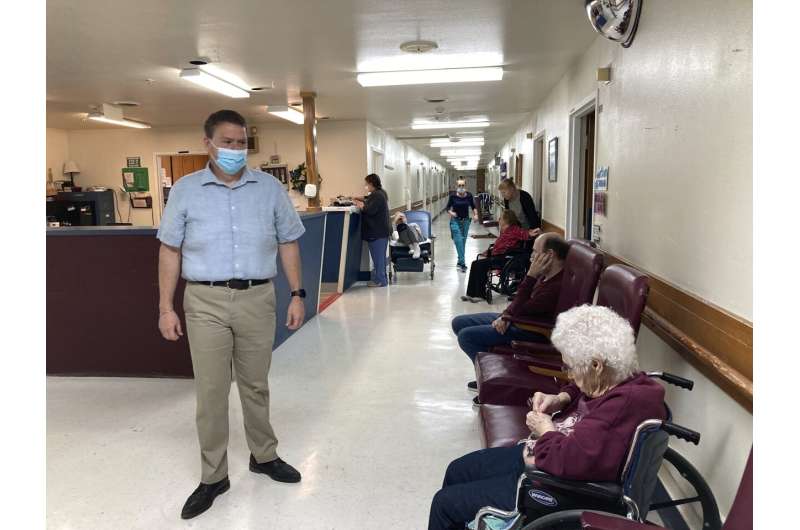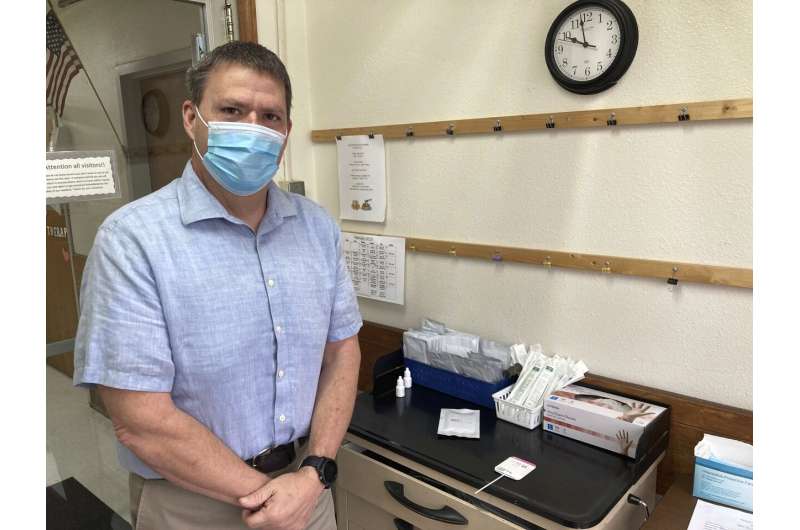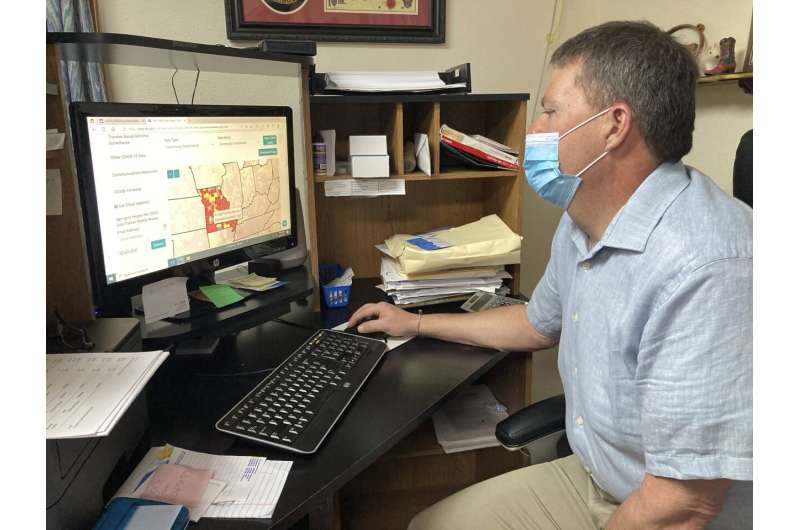This article has been reviewed according to Science X's editorial process and policies. Editors have highlighted the following attributes while ensuring the content's credibility:
fact-checked
reputable news agency
proofread
Health care vaccine mandate remains as some push for an end

At Truman Lake Manor in rural Missouri, every day begins the same way for every employee entering the nursing home's doors—with a swab up the nose, a swirl of testing solution and a brief wait to see whether a thin red line appears indicating a positive COVID-19 case.
Only the healthy are allowed in to care for virus-free residents.
Despite those precautions, a coronavirus outbreak swept through the facility late last year. An inspector subsequently cited it for violating the federal government's COVID-19 vaccination requirement for health care facilities.
Truman Lake Manor is one of about 750 nursing homes and 110 hospitals nationwide written up for violating federal staff vaccination rules during the past year, according to an Associated Press analysis of data from the Centers for Medicare & Medicaid Services. Most were given a bureaucratic nudge to do better—though some nursing homes also received fines, especially when they had multiple other problems.
One year after it began being enforced nationwide on Feb. 20, 2022, the vaccination requirement affecting an estimated 10 million health care workers is the last remaining major mandate from President Joe Biden's sweeping attempt to boost national vaccination rates. Similar requirements for large employers, military members and federal contractors all have been struck down, repealed or partially blocked.
The health care vaccination mandate is scheduled to run until November 2024. But some contend it's time to stop now, citing fewer severe COVID-19 cases, health care staffing shortages and the impending May 11 expiration of a national public health emergency that has been in place since January 2020.
"Their regulations are making it harder to give care—not easier," said Tim Corbin, the administrator of Truman Lake Manor who also doubles as a nurse, adding that "the mandates need to end."
CMS said in a statement to the AP that "the requirement for staff to be fully vaccinated has been a critical step in responding to the pandemic" and "has saved Americans from countless infections, hospitalizations, and death."
The policy requires workers, contractors and volunteers at facilities receiving Medicare or Medicaid payments to have the full primary dosage of an original COVID-19 vaccine, with exemptions for medical or religious reasons. Though nursing homes can be fined for violations, CMS generally gave violating facilities additional time to update their policies and come into compliance.
The Republican-led U.S. House recently passed legislation that would halt the mandate, but the bill is unlikely to pass in the Democratic-led Senate.

Meanwhile, the requirement continues with mixed results and—in some cases—widespread exceptions.
When a state inspector visited Truman Lake Manor in December, a coronavirus outbreak had infected 26 of the 60 residents and about a quarter of the staff within the previous few weeks. Corbin said the outbreak originated from an unvaccinated employee with a religious exemption who tested negative for COVID-19 before working a shift and wore a mask. The employee didn't feel well and tested positive after arriving home.
The inspector found that more than 40% of staff had been granted religious exemptions from getting vaccinated. But the federal Centers for Medicare & Medicaid Services does not scrutinize the rationale for such exemptions. The reason the facility was cited for a vaccination deficiency was because three employees had failed to receive their second dose of the vaccine and had no exemption on record. After the citation, they each got the second shot, and regulators OK'd the corrections in January.
It's hard to find workers willing to be vaccinated, Corbin said, because many local residents remain opposed to the vaccine or doubt its effectiveness. Just 42% of adults in St. Clair County are vaccinated against COVID-19—a rate barely half the national average.
The 120-bed facility is operating at half capacity and turning potential residents away, "because I can't hire enough people to take care of them," said Corbin, who's been running ads touting a $5,000 signing bonus for nurses.
Rhonda Martin, a nurse educator at the facility, said she understands people's hesitancy to get vaccinated. Though she received the initial shots and a booster, Martin still got sick from COVID-19 last fall and missed a couple weeks of work.
"At first, I was all for the vaccine, because I felt as health care workers, we needed to protect ourselves and the patients that we take care of," she said. "The longer that it's been going on, the vaccines haven't seemed to help."
At one facility in Greenwood, South Carolina, the vaccine mandate caused an exodus among nursing staff that took a while to replenish.
"People said, 'You know what? I'm going to just stop working,'" said David Buckshorn, CEO of Wesley Commons in Greenwood. "To have a requirement that someone feels strongly they don't want to follow, that really limits our ability to bring people in."
Workforce shortages are causing more than half of nursing homes nationally to limit resident admissions, according to the American Health Care Association, which represents long-term care facilities. Though most other health care sectors have rebounded, nursing home employment was down 13% in 2022 comparedto pre-pandemic levels and reached lows not seen since the 1990s.

LeadingAge, an association of nonprofit nursing homes and other aging service providers, originally supported the mandate and still encourages vaccinations. But it now says a federal requirement no longer is needed.
"Our country is in a very different place now than in summer of 2021, when the mandate was initially proposed," said LeadingAge President and CEO Katie Smith Sloan.
Though deaths are down significantly from their peak in January 2021, older adults and people with underlying health problems remain more susceptible to serious cases of COVID-19. Because of that, some medical professionals believe the vaccine mandate should continue at nursing homes and hospitals.
"This is an important requirement," said Dr. Georges Benjamin, executive director of the American Public Health Association. "Not only does it protect the health care worker themself, but it also protects the patients."
Some patient advocates also continue to back the vaccine mandate.
"The more we drop requirements in general, the more dangerous it becomes for nursing home residents," said Marjorie Moore, executive director of the St. Louis-based nonprofit VOYCE, which advocates for long-term care residents.
Nationwide, about 5% of the over 15,000 nursing homes caring for Medicare or Medicaid patients have been cited for violating the COVID-19 vaccination requirement, and about 2% of the 4,900 hospitals, according to the AP's analysis. But those citations haven't been evenly spread among states and occurred less often during the latter half of 2022.
Twenty-four states cited no hospitals for COVID-19 vaccination violations.
Nearly 1 in 5 nursing homes received staff vaccination citations in Louisiana, and nearly 1 in 7 in Michigan, the highest rates nationally. By contrast, 14 states and the District of Columbia had two or fewer facilities cited. Texas, which has the most nursing homes nationally participating in Medicare or Medicaid, had just one nursing home cited for violating the vaccination rule.
Kansas, Florida and Texas each declined to check for vaccination violations, instead leaving that process to CMS, which hired contractors. As a result, CMS said Texas was docked more than $2.5 million in federal funding, Florida more than $1.2 million and Kansas nearly $350,000.

Kansas Gov. Laura Kelly, a Democrat who faced reelection in a Republican-leaning state, said last year that the vaccine mandate conflicted with state law and could worsen workforce shortages.
Like Kansas, Kentucky also has a Democratic governor with a Republican-led Legislature. But Gov. Andy Beshear's administration said state inspectors noted no vaccination deficiencies because hospitals and nursing homes all met federal guidelines when accounting for exemptions.
"We have been at the forefront of encouraging vaccines," said Betsy Johnson, president of the Kentucky Association of Health Care Facilities and the Kentucky Center for Assisted Living. "We understand vaccines save lives."
Nationally, the number of nursing homes cited for vaccination violations declined noticeably after CMS last June stopped requiring state inspectors to check for compliance when responding to complaints about unrelated allegations, such as neglect of patients. CMS cited substantial compliance with the vaccination requirement while making the change.
Before then, Gil-Mor Manor in rural Morgan, Minnesota, was one of just three facilities cited for the worst deficiency category, indicating widespread "immediate jeopardy" to residents.
A May inspection report said the facility lacked policies to mitigate the spread of COVID-19—such as requiring N95 masks—for 15 unvaccinated employees with religious exemptions. It said three other employees caring for patients were neither vaccinated nor exempted.
The "failures resulted in 7 of 27 of residents contracting COVID-19," the report said.
The nursing home responded by approving exemptions for the unvaccinated employees, updating its policies and hiring a consultant to provide additional training to its nurse in charge of infection control, facility administrator Terrie Rothmeier said. Inspectors lifted the "immediate jeopardy" designation within three weeks. The facility was not fined.
"We resolved the issue," Rothmeier said.
© 2023 The Associated Press. All rights reserved. This material may not be published, broadcast, rewritten or redistributed without permission.




















